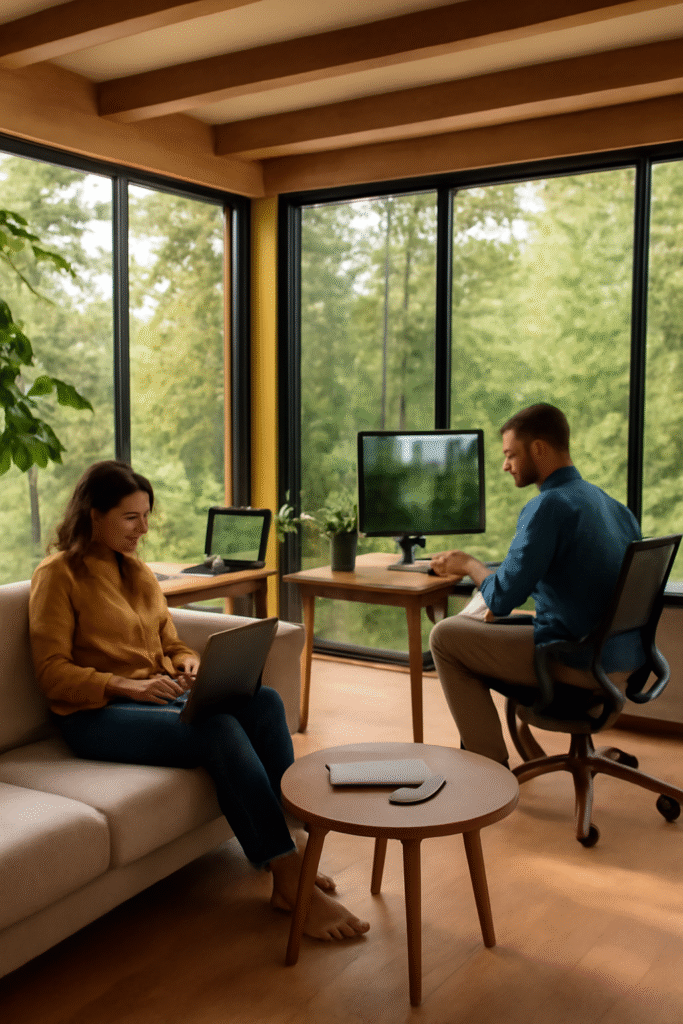Quando o trabalho se adapta à vida, a vida rende mais.
🌍 Dos Escritórios Fixos à Vida Fluida
Não faz muito tempo, um “bom funcionário” era definido pela presença física — chegar às nove, sair às seis, preso a uma mesa sob luz fluorescente. A produtividade era medida pela visibilidade, não pelo valor gerado.
Então, um vírus redesenhou o ritmo do mundo. A pandemia não apenas fechou escritórios; ela abriu mentes. Percebemos que o trabalho nunca foi um lugar — mas uma atividade, uma relação, um conjunto de ideias que se tornam realidade.
O resultado é uma nova filosofia chamada Trabalho Híbrido 2.0 — uma evolução mais profunda do que o simples conforto do home office. Não se trata apenas de alternar entre escritório e sala de estar; trata-se de reescrever o contrato social do trabalho com base em flexibilidade, confiança e qualidade de vida.
Esse novo horizonte coloca a criatividade acima do controle, o propósito acima da presença. Ele nos convida a enxergar o trabalho não como confinamento, mas como conexão.

1. A Ponte para a Era dos Nômades Digitais
A revolução híbrida e o nascimento do nômade digital moderno
A revolução híbrida deu origem, de forma silenciosa, ao nômade digital moderno — profissionais não mais presos à geografia.
Eles criam apresentações em cafés de Lisboa, enviam propostas de espaços de coworking em São Paulo e participam de chamadas de trabalho a partir de chalés nas montanhas de Chiang Mai. A espinha dorsal de suas carreiras é o Wi-Fi; a alma é a mobilidade.
Jovens profissionais estão trocando contratos de aluguel tradicionais por aventuras flexíveis. Famílias também começam a experimentar “anos nômades”, viajando enquanto mantêm seus empregos remotos.
O que antes as empresas temiam como instabilidade agora se transforma em estratégia. Organizações estão aprendendo que felicidade retém talentos melhor do que salário. A libertação do cubículo não é caos — é cultura em movimento.
O trabalho híbrido, em essência, tornou-se uma ideologia: é possível viver plenamente enquanto se trabalha com significado.
2. Liberdade e tempo acima das paredes
Estudos globais recentes mostram de forma consistente que modelos híbridos geram mais foco, menos burnout e maior satisfação.
O maior presente citado pelas pessoas é o tempo — tempo para a família, para descansar, para pensar, para simplesmente existir fora das telas.
Quando o deslocamento diminui, a criatividade respira. Horas perdidas no trânsito viram horas de aprendizado; minutos desperdiçados em elevadores se transformam em conversas no café da manhã.
Os benefícios ambientais também acompanham esse movimento: menos carros, menor pegada de carbono, manhãs mais calmas e com menor consumo de energia.
A nova lógica do trabalho não é onde você está, mas o que você entrega. O trabalho como verbo substitui o trabalho como local. É um reinício cultural, que nos ensina que a liberdade alimenta a responsabilidade melhor do que a vigilância jamais conseguiu.
3. IA — a assistente invisível que devolve tempo
A Inteligência Artificial entrou nessa história de forma discreta, como uma colaboradora benevolente.
Usada de maneira ética, a IA não é o olhar do chefe — é a aliada do trabalhador, uma arquiteta silenciosa do tempo.
Ela resume horas de reuniões em anotações claras, organiza agendas para proteger o foco, traduz idiomas e fusos horários, e assume tarefas repetitivas que drenam energia criativa.
Para freelances que transitam entre continentes, a IA se torna uma colega invisível e confiável, eliminando burocracias e devolvendo o centro criativo do trabalho.
O dia humano recupera textura: menos ruído, mais nuance.
4. A jaula digital: um alerta para o mundo do trabalho
Mas toda nova era carrega suas sombras. Alguns gestores passaram a enxergar a automação não como libertação, mas como vigilância.
Softwares que monitoram teclas digitadas e movimentos do mouse ameaçam transformar a flexibilidade em uma jaula dourada de paranoia.
A reação já começou.
O AI Act, na Europa, estabeleceu limites éticos. No Brasil, a LGPD reforça a privacidade de dados como um direito civil.
Empresas mais conscientes compreenderam que confiança supera controle.
Quando as pessoas se sentem respeitadas, elas se autorregulam naturalmente.
O futuro do trabalho não pode custar exatamente a liberdade que prometeu entregar.
5. Ontem, hoje e amanhã
Ontem, o trabalho girava em torno da presença — o som do ponto, o ritual do deslocamento, a tirania do tempo sob luz fluorescente.
Hoje, o sucesso é medido por resultados, não por horas; por originalidade, não por obediência. Bem-estar finalmente divide espaço com produtividade sem ironia.
E amanhã?
Podemos esperar uma tríade moldando o trabalho global:
Culturas híbridas oferecendo mais autonomia.
Nomadismo digital redefinindo a geografia.
Assistência por IA automatizando o previsível.
Juntas, essas forças desenham uma visão de trabalho mais humana justamente por ser menos mecânica.
As máquinas assumirão a repetição, para que as pessoas recuperem a imaginação — talvez a ferramenta de produtividade mais subestimada da história.I

6. O trabalho híbrido
É apenas um verso dentro de uma revolução tecnológica muito mais ampla que já ecoa por diversos setores.
Na educação, professores usam IA para adaptar aulas ao ritmo de cada aluno, transformando classes padronizadas em diálogos personalizados.
Na saúde, análises preditivas detectam doenças com mais rapidez e menor custo, salvando vidas e tempo precioso.
Na agricultura, algoritmos já preveem safras e otimizam o cuidado do solo em áreas rurais do Brasil, reduzindo desperdícios e fortalecendo a sustentabilidade.
Na ciência e na arte, pesquisadores, designers e escritores colaboram com sistemas inteligentes para imaginar o que ainda não foi imaginado.
Em todos os campos, o refrão se repete: menos trabalho mecânico, mais inteligência criativa e emocional.
A tecnologia, quando guiada pela consciência, não substitui a humanidade — ela a libera.
7. A equação humana do trabalho híbrido
A mentalidade híbrida redefine a identidade profissional. O trabalhador do amanhã não será definido por um cubículo, mas por contribuição, empatia e aprendizado contínuo.
As lideranças também precisam evoluir. Gerir na era do Híbrido 2.0 é menos sobre controle e mais sobre coreografia — orquestrar vozes entre telas, cidades e culturas.
Reuniões se tornam momentos de narrativa. Brainstorms atravessam fusos horários. O crescimento profissional passa a se parecer com uma viagem — imprevisível, rica e contínua.
A cultura corporativa deixa de ser uma “família de funcionários” e se transforma em um ecossistema de colaboradores, onde o ritmo de cada pessoa importa.
A métrica de sucesso muda: uma mente realizada vale mais do que uma agenda cheia.
8. Ética como sistema operacional
A tecnologia evolui rápido; os valores precisam evoluir mais rápido ainda.
Para sustentar o Trabalho Híbrido 2.0, as organizações precisam de estruturas éticas tão sólidas quanto seus sistemas:
Transparência: como os dados são usados e por quem?
Acessibilidade: todos podem participar em igualdade, independentemente de localização ou dispositivo?
Saúde mental: a flexibilidade reduz a pressão ou apenas estende silenciosamente a jornada?
O objetivo é garantir que o progresso não esconda exploração. Inovação real amplia dignidade, não dependência.
O ambiente de trabalho do século XXI precisa programar empatia junto com eficiência.
9. O trabalho híbrido como filosofia de vida
A vida híbrida vai além da logística; é uma posição ética — a insistência de que o trabalho deve servir à vida, não a consumir.
É o pai ou a mãe que participa de uma reunião virtual da sala de casa e, logo depois, leva o filho à escola.
É o designer que divide a semana entre a solitude produtiva e a energia do escritório compartilhado para equilibrar foco e convivência.
É liberdade costurada com propósito.
“Menos telas, mais vida” não significa rejeitar a tecnologia, mas usá-la com intenção — escolher conexão em vez de compulsão.
A próxima onda de evolução corporativa premiará empatia tanto quanto eficiência.
10. Rumo a uma cultura de trabalho com pulso
O futuro do trabalho não será definido por dispositivos, mas por ritmos — pela forma como o labor se integra à experiência de estar vivo.
Nesse novo paradigma, descanso vira estratégia, silêncio vira produtividade e diversidade se torna a língua-mãe da criatividade.
A Inteligência Artificial administra a complexidade; os seres humanos oferecem contexto.
O Trabalho Híbrido 2.0 deixa de simbolizar distância e passa a representar equilíbrio: máquinas fazendo as contas enquanto pessoas continuam sonhando.
O movimento é claro e global — um retorno ao que sempre foi verdade: as pessoas trabalham melhor quando podem viver plenamente.

O refrão global
Em todos os lugares, a mesma mensagem ecoa:
Deixe a tecnologia cuidar das telas para que nós possamos cuidar do sentido.
O trabalho está evoluindo para uma parceria entre humanos e máquinas que valoriza empatia e imaginação mais do que métricas frias.
E o hibridismo, que começou como um plano de contingência, está se tornando silenciosamente uma nova arte de viver.
Se a Inteligência Artificial for usada com responsabilidade, ela não vai escravizar — vai empoderar.
Ela permitirá um equilíbrio mais justo entre ambição e afeto, entre ganhar a vida e viver de verdade.
Na era do Trabalho Híbrido 2.0, a revolução é suave, mas inegável:
Um mundo em que o equilíbrio não é mais uma aspiração distante, mas um hábito cotidiano — onde as pessoas crescem profissionalmente sem encolher a própria vida.
